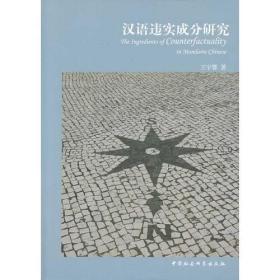
汉语违实成分研究9787516138243
正版图书,可开发票,请放心购买。
¥ 36.38 6.3折 ¥ 58 全新
仅1件
广东广州
认证卖家担保交易快速发货售后保障
作者王宇婴
出版社中国社会科学出版社
ISBN9787516138243
出版时间2013-12
装帧平装
开本其他
定价58元
货号8182118
上书时间2024-12-20
- 店主推荐
- 最新上架
商品详情
- 品相描述:全新
- 商品描述
-
目录
Foreword
List of Abbreviations
CHAPTER ONE INTRODUCTION
1.1 Theories
of Conditionals and CFCs
1.2 Goals of This Book
1.3 Some Basic Concepts
of Conditionals
1.3.1 Various Conditionals
1.3.2 Examining the
Grammatical Features of Conditionals
1.4 Structure of This Book
CHAPTER
TWO A SURVEY OF CONDITIONALS AND CFCS IN CHINESE
2.1 Chinese Conditionals
2.1.1 Conditionals vs.Hypotheticals:A New Definition
2.1.2
Subclassification of Conditionals
2.1.3 Chinese and English Conditionals
2.1.3.1 Chinese Donkey Sentences
2.1.3.2 Tense Expressions
2.1.4
Some Grammatical Features of Conditionals in Chinese
2.1.4.1 Hypothetical
Conjunctions
2.1.4.2 The Components of a Conditional
2.1.4.3
Subjectivity in Conditionals
2.1.4.4 Conditional as a Typical Irrealis Modal
Sentence
2.2 Some Basic Concepts about CFCs
2.2.1 Definitions
2.2.2
CF Sentence as Subjectivised Construction
2.2.3 Modality and CFC
CHAPTER
THREE LITERATURE REVIEW
3.1 Early Stage(before 1980s)
3.2 Middle
Stage(mid 1980s to early 2000s)
3.2.1 Guohua Chen(1988)and Yan Jiang(2000)
3.2.2 Weixian Wang et a1.(1994),Fuyi Xing(2001) and Jiaxuan Shen(2003)
3.3 Recent Stage(Since the beginning of the 21 st century till now
3.3.1
Realis VS.Irrealis—Xiaoying Luo(2006),Min Li(2006),Xiaoling Wang(2007),Xueping
Zhang(2008)
3.3.2 Psychological Experimental Approach
3.3.3 Linguistic
Approach(Yaoshi(要是)VS.Yaobushi(要不是)一Yuying Su(2008))
CHAPTER FOUR CF
INGREDIENTS(Ⅰ):TEMPORAL EXPRESSIONS
4.1 A Brief Review of the Previous
Studies on Temporal Structure in Chinese
4.1.1 Tripartite Temporal
Structure—Ping Chen(1988)
4.1.2 Formal Approaches—Yan Jiang&Haihua
Pan(2005)
4.1.3 Temporal Reference—Yang Gu(2007)
4.1.4 Relevance—Account
of le(了)and guo(过)一Ljungqvist(2007)
4.2 An Analysis Based on Tripartite
Temporal System
4.2.1 Phase
4.2.2 Aspect
4.2.3 Tense
4.3 More on
Temporal Anchoring
4.4 Interim Summary
CHAPTER FIVE CF INGREDIENTS(Ⅱ)
5.1 Hypothetical Conjunctions
5.1.1
Ruguo(如果)(Yaoshi(要是),Yao(要),Jiaru(假如),Jiashi(假使),Jiashe(假设),Tangruo(倘若),Ruruo(如若),Sheruo(设若),etc.)
5.1.2 Yaobushi(要不是)(Ruofei(若非),Ruobushi(若不是),Ruguobushi(如果不是),etc.)
5.1.3 Wanyi(万一)
5.1.4 A Brief Summary
5.1.5 CF Sentences Without
C0njunctions
5.2 Negation
5.3 Personal Pronouns
5.4 Rhetorical
Questions
5.5 CF Enhancers
5.6 Summary
CHAPTER SIX GENERATING
COUNTERFACTUALITY IN MANDARIN CONDITIONAL SENTENCES
6.1 Context Determinism
vs.Ingredient Determinism
6.2 Minimalism, Contextualism and Indexicalism
6.3 A Three—Layer Context System
6.3.1 CF Ingredients:Local Context
6.3.1.1 CF Ingredients Revisited
6.3.1.2 Numbers Talk
6.3.1.3
Working Mechanism
6.3.2 Protasis and Apodosis:Compound Sentence Context
6.3.2.1 Binding Argument
6.3.2.2 From Protasis to Apodosis:A Process of
Saturation
6.3.3 Macro Context
6.3.4 Interaction of Three Layers of
Contexts
CHAPTER SEVEN CONCLUSIONS AND PROSPECTS FOR FUTURE RESEARCH
7.1
More on the Interpretational System
7.2 Recapitulation
7.3 Suggestions
for Future Research
REFERENCES
APPENDIX Ⅰ
APPENDIX Ⅱ
APPENDIX Ⅲ
APPENDIX Ⅳ
APPENDIX Ⅴ
Acknowledgements
相关推荐
— 没有更多了 —































以下为对购买帮助不大的评价